Research
June 11, 2025
Lisa Orii receives Global Innovation Fund Award to integrate AI in app-based person-centered contraception services in Kenya
Categories: Awards, Certificate Program, Contraception, Family Planning, Research, students
 Congratulations to Lisa Orii, PhD candidate in the School of Computer Science & Engineering and Global WACh Graduate Certificate Program, for receiving a 2025 UW Global Innovation Fund Award. The fund supports transformative cross-college, cross-continent research collaborations and global Husky learning experiences at UW.
Congratulations to Lisa Orii, PhD candidate in the School of Computer Science & Engineering and Global WACh Graduate Certificate Program, for receiving a 2025 UW Global Innovation Fund Award. The fund supports transformative cross-college, cross-continent research collaborations and global Husky learning experiences at UW.
Lisa will work with researchers at UW and Kenya Medical Research Institute (KEMRI) on a project titled, “Co-Design of Chatbots for App-Supported Person-Centered Contraceptive Decision Support among Adolescent Girls and Young Women in Kenya in the Pharmacy Setting.” The research team includes Drs. Elizabeth Harrington (UW Global Health and Obstetrics & Gynecology), Elizabeth Bukusi (KEMRI), Serah Gitome (KEMRI), and Richard Anderson (UW Computer Science & Engineering). (more…)
June 6, 2025
Global WACh hosts annual Student Poster Symposium highlighting graduate student research
Categories: Certificate Program, HIV and Co-Infections, Implementation Science, PrEP, Research, Talks and Events

On Wednesday, June 4th, Global WACh hosted its annual Student Poster Symposium to highlight graduate student research affiliated with our center. Dozens of UW faculty, staff, students attended to learn about 17 students’ projects that fulfilled academic capstone and dissertation requirements, while providing opportunities to gain knowledge and build marketable skillsets in the field of maternal-child health.
The majority of presenters are enrolled in the Global WACh Graduate Certificate Program and are graduating in the 2025 academic year. The certificate program offers opportunities for additional learning about woman, adolescent, and child health topics through 12 credits of coursework and a 90-hour capstone. We wish these students the very best in their future endeavors as public health professionals.
Additional posters featured master and doctoral degree capstones and dissertations that led to major advancements in the scientific field and were featured at the recent Conference on Retroviruses and Opportunistic Infections (CROI) held in San Francisco in March. CROI is considered the world’s leading HIV research meeting that attracts thousands of researchers and clinicians from around the globe – and is a fantastic stage to showcase our emerging early-stage researchers.
See the full list of participating students and their poster titles below. Click here to view the photo gallery courtesy of the Department of Global Health Communications team. (more…)
May 15, 2025
Dr. Taylor Hendrixson, UW Pediatrics Assistant Professor, receives 2025 CFAR New Investigator Award
Categories: Awards, Children, Research
 Congratulations to Dr. Taylor Hendrixson, Assistant Professor in UW Pediatrics, for receiving a 2025 UW/Fred Hutch Center for AIDS Research (CFAR) New Investigator Award! The two-year award focuses on supporting early career investigators to conduct independent HIV research and apply for future funding to continue their HIV/AIDS research careers.
Congratulations to Dr. Taylor Hendrixson, Assistant Professor in UW Pediatrics, for receiving a 2025 UW/Fred Hutch Center for AIDS Research (CFAR) New Investigator Award! The two-year award focuses on supporting early career investigators to conduct independent HIV research and apply for future funding to continue their HIV/AIDS research careers.
Dr. Hendrixson is a neonatologist, pediatric infectious disease physician and faculty within the UW Department of Pediatrics. His research has focused on improving maternal and early infant nutrition to optimize growth and improve long-term outcomes in low- and middle-income settings. He works on clinical and clinical-translational trials targeting populations at high-risk for nutritional deficiencies and growth faltering. He is the PI of a K23 award investigating multi-omic interactions of the maternal-breastmilk-infant triad and associations with clinical outcomes among women living with HIV and their infants HIV-exposed uninfected in Kenya.
With support from the new award, Dr. Hendrixson will investigate anemia and iron status in pregnancy among women living with HIV and associations with neurodevelopmental outcomes of children HIV-exposed uninfected to guide future interventional studies. (more…)
Postdoctoral Scholar-Fellow Dr. Jillian Neary receives 2025 CFAR New Investigator Award
Categories: Awards, Children, Research
 Congratulations to Dr. Jillian Neary, Postdoctoral Scholar-Fellow with Global WACh, for receiving a 2025 UW/Fred Hutch Center for AIDS Research (CFAR) New Investigator Award! The two-year award focuses on supporting early career investigators to conduct independent HIV research and apply for future funding to continue their HIV/AIDS research careers.
Congratulations to Dr. Jillian Neary, Postdoctoral Scholar-Fellow with Global WACh, for receiving a 2025 UW/Fred Hutch Center for AIDS Research (CFAR) New Investigator Award! The two-year award focuses on supporting early career investigators to conduct independent HIV research and apply for future funding to continue their HIV/AIDS research careers.
Dr. Neary’s past work focused on strategies to increase pediatric HIV testing and improve HIV care for adolescents with HIV. Recently, her work focused on molecular epidemiology including HIV viral control among children with HIV and biomarkers of biological aging among children who were exposed to HIV in utero.
With support from the new award, she plans to explore whether breastfeeding and human milk oligosaccharide composition are associated with child telomere length (TL) among children in Kenya who were exposed to HIV in utero. The evidence fills an important need to further understand how breastfeeding may influence short- and long-term health outcomes.
April 25, 2025
Global WACh team supports Sukarya to build a data-driven adolescent health program in Rajasthan
Categories: Research
In August 2024, team members from Global WACh at the University of Washington had the opportunity to visit India as part of a research partnership with Sukarya, a non-governmental organization focused on improving health outcomes and promoting gender equity in India’s slum communities.
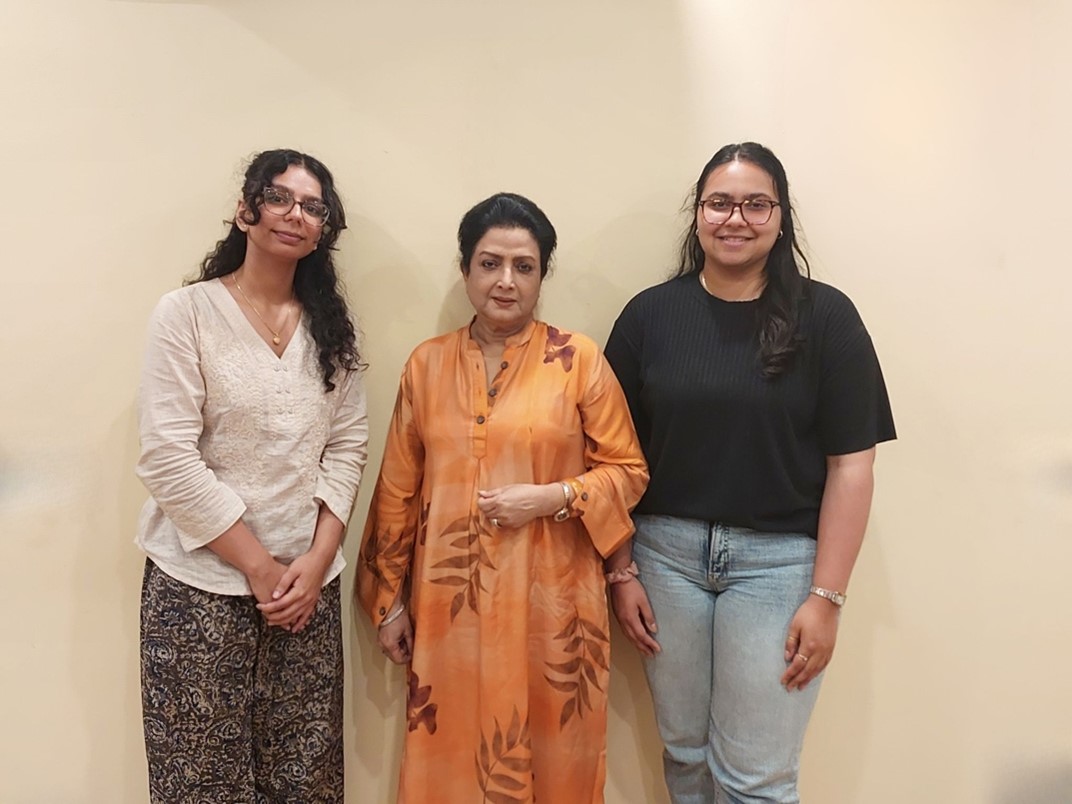
Pictured from left to right: Simran Purewal (Student Assistant, UW), Meera Satpathy (Founder and Chairperson, Sukarya), Rishika Mohanty (Project Coordinator, UW)
Sukarya was founded in 1998 by its chairperson and health innovator Ms. Meera Satpathy, and strives to improve the well-being of women, children and adolescents through delivering critical health, equity and gender-based programs. The organization has benefitted more than 6 million people in over 650 villages and 120 slums in rural areas of Haryan, Rajasthan, Delhi and Gurugram. Since its founding, Sukarya has won many awards for its impactful work, and is ranked in the Top 10 Trusted NGOs in India by the Fortune Leadership Awards.
In 2024, Drs. Tickell and Wagner joined forces with Sukarya to win a Global Innovation Fund (GIF) supporting the creation of a bi-directional partnerships between UW and Sukarya. With this funding, the UW team has supported Sukarya in design as innovative Social Behavior Change Communication (SBCC) adolescent health program drive by local data. Members of UW were able to travel to New Delhi, India to conduct a data needs assessment for Sukarya’s SBCC program. This initiative aims to foster positive changes in knowledge, attitudes, and behaviors related to personal health, hygiene, nutrition, menstrual health, sexual health, family planning, mental health, and substance abuse among adolescents. The program’s goal is to empower adolescent with the knowledge and tools they need to make informed decisions about their health and well-being. The goal of the data needs assessment was to determine the optimal method of digital data collection to track participants changes in knowledge, attitudes, and behaviors. (more…)
MAMMS-IYCF study team wins Top Abstract Award at the 2025 KEMRI Annual Scientific and Research Conference
Categories: Awards, Gut Health and Child Survival, HIV, Research
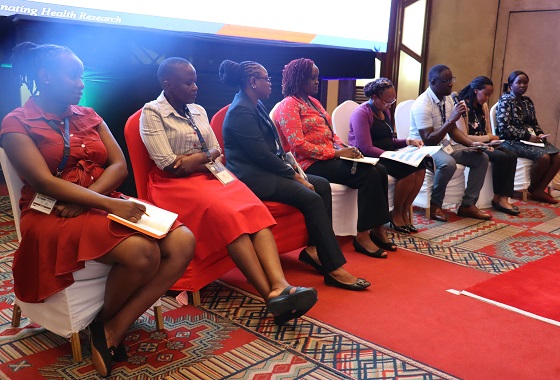
MAMMS-IYCF study team members participated in a live Q&A session at KASH 2025.
“A pilot study to develop and test a two-way SMS Platform to recognize and prevent wasting among HIV-infected and HIV-exposed uninfected children in Kenya” summarized how Dr. Edemba and a collaborative team from UW and Kenya Medical Research Institute adapted the Maternally Administrated Malnutrition Monitoring System (MAMMS) mHealth platform – in which caregivers measure their child’s mid-upper arm circumference on a weekly basis and communicate color-coded findings with healthcare workers via SMS text message – to include messages on infant and young child feeding (IYCF). The study team integrated these tailored messages and administered them to caregivers seeking care for children exposed to HIV at the Homa Boy and Migroi County referral hospitals over a two year period. (more…)
March 21, 2025
MIND collaborators convene for child development research in Nairobi, Kenya
Categories: HIV and Co-Infections, Mental Health, PrEP, Research
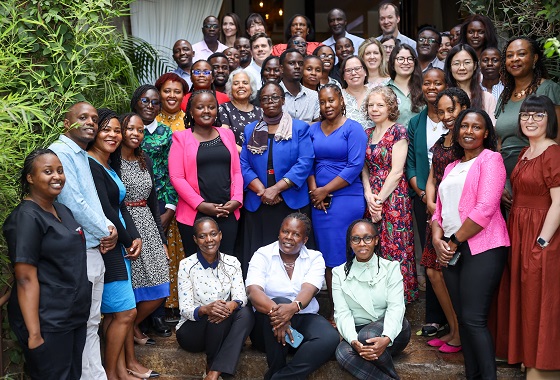
MIND collaborators at the Palacina Suites Hotel in Nairobi, Kenya. Photo: Mugo Mureithi
It is a remarkable partnership involving several investigators and administrators from UW/Global WACh, Kenyatta National Hospital, University of Nairobi, Kenya Medical Research Institute, Emory University, Fred Hutch, Seattle Children’s Hospital, and Makerere University who share knowledge and common resources to generate evidence on biological factors that may cause adverse birth and neurodevelopmental outcomes in young children exposed to HIV but are uninfected. The two-day convening provided a forum to share progress since the inaugural meeting in January 2024 and team retreat at UW in October 2024, and to discuss future directions of research collaborations. (more…)
March 20, 2025
Enterics for Global Health (EFGH) collaborators convene in Kenya for pediatric diarrheal disease research
Categories: Gut Health and Child Survival, Research
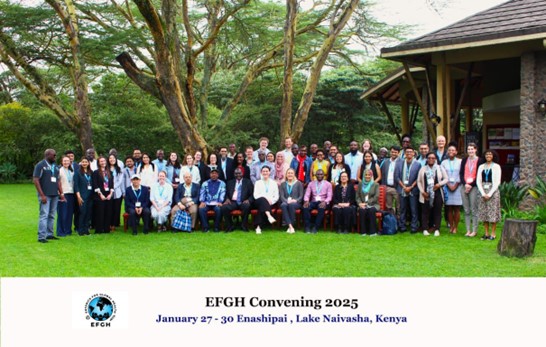
The Enterics for Global Health (EFGH) Shigella surveillance study held its annual convening from January 27-30 in Lake Naivasha, Kenya. Over sixty collaborators from around the world gathered to collectively workshop primary manuscripts, and plan for the next phase of the study (“Phase C”) which will focus on results dissemination, supporting secondary data analyses, and conducting implementation research to characterize policy-maker priorities for Shigella vaccine adoption. (more…)
March 19, 2025
Researchers present the latest scientific discoveries in HIV research at CROI 2025
Categories: HIV and Co-Infections, PrEP, Research
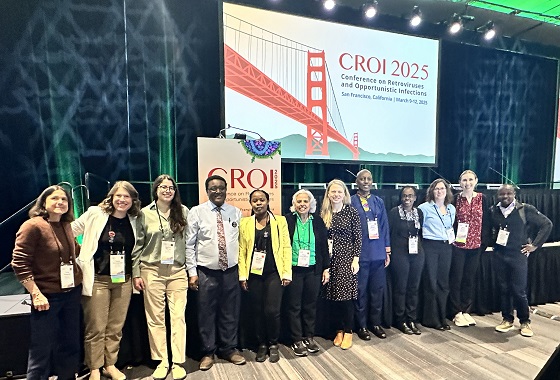
Researchers from the US and Kenya at CROI 2025.
Global WACh researchers and collaborators participated in this year’s Conference on Retroviruses and Opportunistic Infections (CROI), held from March 9th-12th in San Francisco, CA. They shared the latest discoveries in the HIV and Co-Infectious Through the Lifecycle research portfolio related to health outcomes among children exposed to HIV and ART in utero, HIV acquisition and prevention during pregnancy and breastfeeding, and preventative therapies to treat tuberculosis among people living with HIV. (more…)
March 12, 2025
Mobile WACh NEO trial results on the impact of interactive text communication on neonatal mortality in Kenya
Categories: Family Planning, Publication, Research
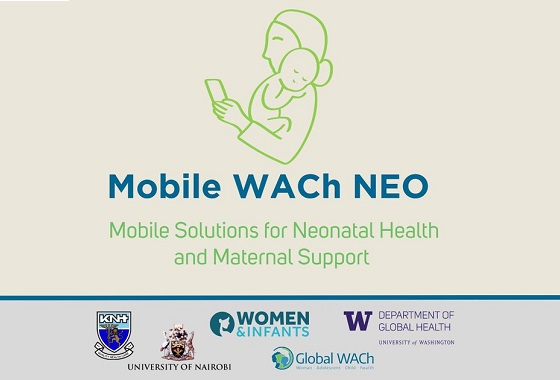
Each year, approximately 40,000 neonatal deaths occur in Kenya. While a vast majority of these deaths are preventable, newborn care practices and clinical care seeking may be delayed by several factors including lack of knowledge, decision making ability, and poor quality of care. To support mothers during this critical phase, researchers from UW Department of Global Health/Global WACh, Kenyatta National Hospital and Women and Infants Hospital designed the Mobile WACh NEO randomized controlled trial.
Mobile WACh NEO utilized texting communication to provide information, motivation, and real time decision support to mothers in Kenya to help them identify and seek care for neonatal illness. Aiming to determine the effect of tailored, texting communication on neonatal mortality, the study had surprising results: the intervention did not reduce neonatal mortality rates but did increase clinical care seeking.
Read the full Mobile WACh NEO trial paper here: https://lnkd.in/gBp4Qymx
Via the UW Department of Global Health
Next page